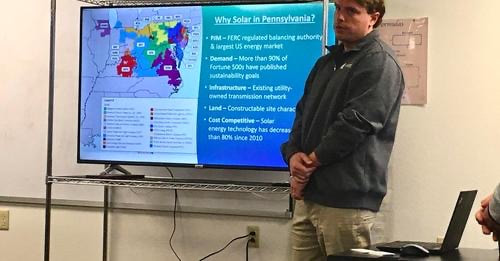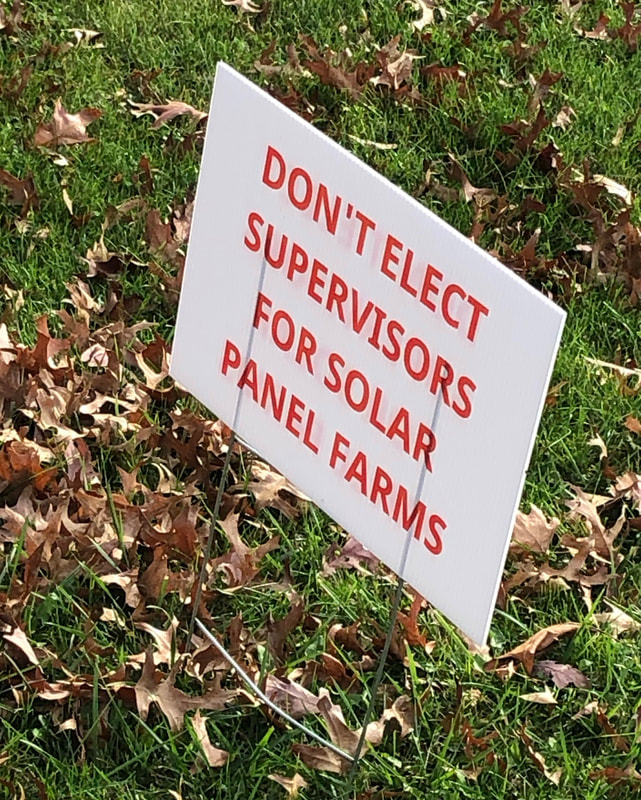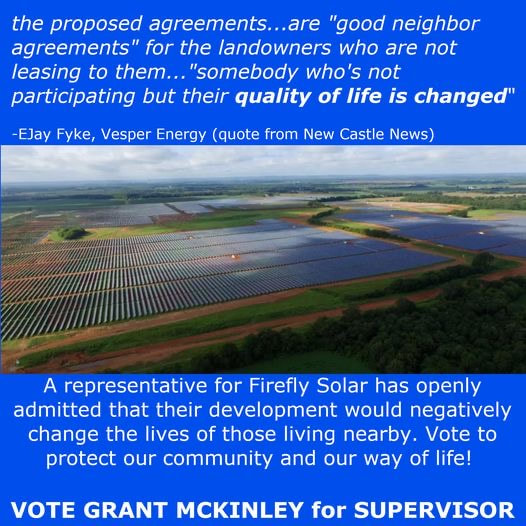- How this could impact you
-
How green is solar
- Solar energy in not free from CO2 emissions
- How much energy do solar panels produce?
- Disadvantages of solar
- Do industrial scale solar panels break?
- Chemical make of solar panels
- Weed control / native screening
- Does this Look Clean and Green?
- Carbon footprint
- Recycling panels
- The illusion to be “green”
- More about solar
- Lawrence County
- Keeping up to date
|
By Debbie Wachter | New Castle News An informational meeting by Vesper Energy about its North Beaver Township Firefly Solar project turned into a verbal ear-boxing session as farmers questioned the company’s motives for wanting prime farmland for solar energy. And although Vesper representatives claimed they had nothing to do with the recent smear campaign against incumbent township Supervisor Grant McKinley by his opponent in the Nov. 7 election, the flavor of some emails and text messages disseminated against him by a Texas political action group brought the company under fire for them. EJay Fike, Vesper’s manager of community affairs, admitted to a group of about 15 people that the company’s introduction to farmers five years ago with proposed leases for their farmland was not done correctly. Fike joined the company in the spring of this year hoping to smooth over some hard feelings and emphasize the company is trying to be a good fit in the community. Some of that smoothing has involved a pledge to pay the Mohawk Area School District $350,000 over 10 years and make the same offer to the township and the county. The company also is giving funds to certain nonprofit agencies to spread its goodwill, Fike said. The Friday lunch meeting was sponsored by Forward Lawrence — Lawrence County’s umbrella organization over its economic development corporation and chamber of commerce — as one of its Noontime Knowledge events. Vesper came into the township about five years ago with its proposed Firefly Solar project, seeking to lease farmland in North Beaver Township to construct contiguous glass solar panels for the generation of industrial solar energy. When the project came to light, and to preserve prime farmland and heeding public sentiment against it, the supervisors approved a change to the zoning ordinance that limits industrial solar to industrial land in the township only. And while one farmer, Herman Cvetan, wanted to lease his land and fought the ordinance by filing an action with the governor’s office, he was unsuccessful. Vesper passed up the 30-day window to file an appeal to the ordinance change in court. Cvetan instead ran against McKinley in the township supervisor’s race, vowing if he won he would overturn the ordinance. During the campaign, emails and mailings attempting to discredit McKinley were sent out to township residents, only bolstering the community’s opinion in favor of him, and he was re-elected by a landslide. The emails had been paid for and disseminated by a political action group called R.E.D PAC, based in Houston, Texas. Vesper Energy is based in Irving, Texas, about 200 miles from Houston. Fyke, who has a background in campaign management, swore to the group Friday his company had nothing to do with the text messages or the campaign, nor did Vesper fund any money to that group, he said. Several in attendance, including McKinley, asked why the company sat silent and did not bring that to light until the election was over. Stuart Day of North Beaver Township said Vesper’s presence in the community has created a divisiveness among the landowners. “This community has had farmers who have lived here and done farming together for 200 years, and you guys came in and they’re not speaking to each other now,” he said. “This is just a bunch of corporate speak.” He added, “For five years we’ve told you we don’t want you here, and you’re still here. Why are we still here talking about this?” McKinley and Scott Barth, who also attended the session, are the two elected supervisors who voted to allow industrial solar panels only on industrial land and not on prime farmland. The next municipal election isn’t for two years, and both are staunch about their position. Fyke said the company has no plans to exercise eminent domain against farmers who will not sign leases, nor does it intend to file any lawsuits challenging the ordinance terms. McKinley questioned the 300 jobs the company promises to create, countering those will be temporary for construction jobs only. He pointed out many farmers and their help would be losing their jobs if the solar project materializes on farmland. Joe Torkelson, Vesper’s development manager, explained that North Beaver is the location eyed for the 2,000-acre, 400-megawatt project because it is near an existing utility-owned transmission line by First Energy. Firefly would sign a 15- to 20-year power purchase agreement with a yet-unknown company, enabling Vesper to sell energy at a contracted fixed rate for the next 15 to 20 years, Torkelson said. Fyke said the company already has agreements with two local industries to buy the power, but those are just “handshake agreements” until the company gets started. https://www.ncnewsonline.com/news/local_news/solar-company-comes-under-fire-at-luncheon/article_6988f0ec-8574-11ee-b1ac-838fd0fcd249.html
0 Comments
Thank you:
BE AWARE! Solar is not gone! They will continue to:
A source sent us this sign they found in North Beaver Township.
Good job! Remember polling stations close at 8 pm tonight. Don't forget to vote! Less than 24 hours until voting starts!.
Don’t just assume your friends, family and neighbors know or understand! WE ARE GETTING NUMEROUS REPORTS BACK that some do not realize what is at stake with this township supervisor election. Many are saying they have heard about industrial solar, but did not realize it has anything to do with the township supervisor position. We encourage you make a Facebook post or send an email explaining your position of what is at stake and that voting for Grant Mckinley will keep industrial solar out of North Beaver township. Or, you can go to our website www.moreaboutsolar.com and share videos or articles with them what you find most disturbing about industrial solar. Your and THEIR VOTES COUNT TOO! A text msg went out ahead of the upcoming supervisor election. It accused the incumbent of horrible corruption and profiteering in his position. A completely unsubstantiated claim.
This is a Texas-based super PAC working for the interests of an out-of-state hedge fund-owned corporation, pitting a community of people against someone who has done an excellent job as supervisor. Grant Mckinley has brought more money to the township in grants and other sources than Vesper promises to bring. I think, even if you support industrial solar, this corrosive and toxic politics should be a bridge too far. It's gross to allow this kind of attack on a fellow community member with a long-standing family history in the area and who has done nothing but try to do his best to serve the community. If nothing else... it should be a huge red flag that tells you all you need to know about what kind of people you are dealing with if you have signed those lease agreements. https://www.facebook.com/learnmoreaboutsolar Here is an example of how the promise of big money can influence: The “members of the Mohawk School board respectfully ask that you reconsider the limiting solar ordinance". This letter was sent to the North Beaver Township supervisors.
https://drive.google.com/file/d/1pbjejnbJrICQTclCbkSV06GyGK6FZ3io/view?pli=1 There is more: "The (Mohawk School) district’s administration signed a “contribution agreement” to accept the funds should the Firefly project commence. The district by accepting would stand to collect $10 million from Vesper over the 40 years of the project, according to a district-generated news release." Learn more here Watch footage from a drone as it lifts off from a back yard and does a panoramic view of the industrial solar fields surrounding the house and farms in Illinois. (No sound).
Vote responsibly on November 7th and let’s keep industrial solar ON industrial land and OFF prime farmland! And: Like, Follow and Share More About Solar so other can see what this could look like. https://www.facebook.com/clint.beach.1/videos/786428169141459 Note, this was to be a 3 part series, but thanks the Mr. and Mrs. Musser reaching out; we learn how the solar company is still using their influence of big money to buy favor.
By Debbie Wachter | New Castle News Oct 21, 2023 (Part 4 of 4) A North Beaver Township couple whose dairy farm dates back to the Revolutionary War says they’ve received a proposed contract from Vesper Energy with a generous money offer to keep them from bad-mouthing a proposed solar farm project in their area. The contract proposal from Vesper Energy of Allen, Texas, arrived at the Musser’s North Beaver Township dairy farm, which dates back to the Revolutionary War, by FedEx delivery Aug. 14, Betsy Musser said. She and husband Dennis own 213 acres on Hope Road bordering the SNPJ camp. They raise 350 dairy cows and also have a herd of beef cows. The Mussers are emphatic they don’t want to lease their prime farmland for Vesper’s proposed Firefly Solar project, which would generate electricity for business and industry, despite the company’s $30,000 offer to keep them from talking negatively about the project. They said in a recent phone interview that they did not sign the proposed shut-up contract, nor do they intend to sign it. “I’m against solar in any place on top of crop grounds,” Dennis Musser, 73, said. “Also, they’ll cut the timber wherever they go and there won’t be any woods left, and there won’t be any hunting grounds because the safety zones will be within 150 yards of it. “This solar project is a joke, in my opinion,” he said. “I’ve never gotten involved politically in anything, until now.” The Musser farm originated from a Revolutionary War grant, and the Mussers’ daughter, Cassie, 30, will be the eighth generation to take it over. The home farm is in agricultural preservation, as is Betsy Musser’s nearby family farm where she was raised, another 130 acres the family farms for crops and beef grazing on Mount Air Road. They also have rental acreage. The Vesper contract proposal arrived with no cover letter, Betsy said, and the return address is from Jessica Stephens, a company representative in Albuquerque, New Mexico. “It’s a formal contract in legal jargon, with my wife’s and my name,” Dennis Musser said. “If we would sign it, on that date they’ll pay us $10,000 but we cannot say anything derogatory about this solar project. When they start construction, they would pay us another $30,000 and we can’t say anything. This is what they call the ‘good neighbor’ policy. “It’s nothing more than to keep our mouths shut,” he said. The company’s contract form calls it the “project cooperation agreement.” It provides that upon payment, the property owner will not object to, or in any way oppose the construction, installation or operation of the project, and will not take any direct or indirect action opposing the company’s application for the project before any federal, state or local authority. The contract proposal also requires, once signed, the property owner be bound to confidentiality about it, except to potential purchasers of property. Area farm leases signed with Vesper three to five years ago in the North Beaver Township area are about to expire this year, according to some of the farmers and a Vesper spokesman. Vesper has been meeting with landowners to try to renew those leases and push for new interest in the proposed project that would provide electricity to businesses and industry. Betsy Musser, 59, commented, “I don’t have a problem with solar being on ground that’s not farmable, but I have a problem with using good ground for it, and I don’t understand why people don’t see that their food isn’t going to come from a grocery store. The good Lord gave us so much ground to feed ourselves. “I don’t know if anybody else got these letters,” she said. The Musser farm and the nearby Barth farm form a rectangle of land where the owners have not signed contracts to lease for the project, she said. EJay Fyke, community affairs manager of Vesper Energy, said the proposed agreements, such as the one the Mussers received, are “good neighbor agreements” for the landowners who are not leasing to them, “so they would get something out of it and we would get something out of it — somebody who’s not participating but their quality of life is changed.” Vesper has contacted such families dozens of times, along with leaders of the opposition to the project, and they were told the offers were coming in the mail, Fyke said, noting not all are the same. Some offers, in lieu of monetary compensation, guarantees like screening, allowing the neighbors to choose vegetation, changing the design, planting trees, building a driveway or installing a certain type of fencing. “It’s up to the neighbors and what they want to make this project amenable to them,” he said. “For them, it’s essentially, ‘if you’re unhappy with the project, this is a way that, if there’s people who feel they’re getting a raw deal, we try to address people’s concerns. They’re all tailored differently.” He said the company is focusing such offers on a handful of property owners who are closest to the project area. He noted Vesper also is making local donations to organizations, like $1,000 to the Lawrence County Fair toward its fireworks display. “We’re really trying to be a part of the community,” he said. “We’re trying to engage and become a part of the community, rather than being a faceless organization from Texas.” Vesper’s grant program allocates $30,000 a year, broken into various amounts, and it has given to United Way, a Little League organization and DON Services locally, Fyke said. If the project goes forth, Vesper also is trying to secure a local manufacturer for the project, to keep the money local, he said. [email protected] With photos: https://www.ncnewsonline.com/news/local_news/solar-dilemma-opposing-farm-owners-decline-vespers-money-offer/article_dc43c862-4048-11ee-8bc8-bf7a281c29d8.html By Debbie Wachter | New Castle News. (Part 3 of 4) Vesper Energy of Allen, Texas, has been trying to spread the positive word about the importance of solar energy generated from panels on farmland and the potential benefits to farmers, the environment and the economy. In promoting its proposed Firefly Solar project, its representatives took its information to a public open house in August at the Scottish Rite Cathedral. Fewer than 10 people attended, and a couple were farmers. A ripple of doubt has spread among the North Beaver Township farm community about what the leases on their farmland would offer them and what their liabilities might be, should they lease their land for solar power. State lawmakers now are looking at tax incentives to get solar companies to locate on other types of land where it’s less invasive than on prime agricultural acreage. Representatives of Vesper and the Pennsylvania Conservative Energy discussed the benefits of solar energy and the company’s plans to lease farmland in North Beaver, which were halted two years ago when the township supervisors adopted an ordinance limiting commercial/industrial solar energy generation to industrial zones only. Vesper did not appeal the township decision to court within the 30-day window. One farmer who signed a lease with Vesper challenged the ordinance with the state Office of the Attorney General, but his challenge was denied. Thus, the ordinance stands. FARMLAND BILL State Sen. Doug Mastriano (R-33) has introduced a bill that would prohibit large-scale solar project developments on prime Pennsylvania farmland. Senate Bill 798 would not allow development on land considered prime, or best for farming and crop production, by the U.S. Department of Agriculture’s Natural Resource Conservation Service in classes of I, II, III and IV. The bill would create a state tax credit program unavailable in any other state to provide incentives for solar companies to develop on alternative sites, such as brownfields or old industrial lots, abandoned strip-mined land, capped landfills, warehouse rooftops and surface parking lots. The bill is in the Senate Agriculture and Rural Affairs Committee. State Sen. Elder Vogel, committee chairman who owns a dairy farm in Beaver County, said he agrees with the bill. “You’d be tying up good farmland for 30 to 40 years for a small amount of rent, and at some point, we’re going to run out of farmland,” he said. “That’s a lot of time for a generation of a family to come and go.” WHAT FARMERS SAY The largest farm advocacy groups in the state, the Pennsylvania Farm Bureau and the Pennsylvania State Grange, support policies that protect prime farmland from large-scale solar developments. Clifford Wallace, a North Beaver farmer and the Beaver-Lawrence Farm Bureau president, said an immediate concern of farmers is ensuring that the solar energy company posts an appropriate bond to reclaim the land, should the company go bankrupt. He said farmers prefer class I and II soil for its organic matter and farmability, while solar companies might prefer it for its convenience. “We’re not against solar — it’s going to be a piece of future policy, but there are thousands of acres of reclaimed strip mine with little topsoil within this county, and only a little bit of that was included in the Vesper project,” Wallace explained. “From our standpoint, if you want to put solar in, why not use that land? It will have minimal impact on the production of crops and can produce a tremendous amount of energy.” Wallace said the farmers have unanswered questions about Vesper’s proposed contracts and their renewal clauses. “Once the properties go into use, they’re probably going to stay in, long-term, and you’ll see renewals and updates of technology, but these are all question marks that we have,” Wallace said. Vesper was looking to lease about 2,700 acres initially, in North Beaver Township, Wallace said. The company has invested money in surveying and identifying wetlands, trees and setbacks, which reduces their actual project size to about 1,300 acres, and the prime farmland is the remaining piece of land that can be used, Wallace pointed out. “We’re in a sweet spot here, where we’re having good production of crops in this county. We need to look at what we should be doing with our land and what will be the right thing as you look back in 50 years.” He noted that Vesper “jumped into a situation where the company was able to acquire a lot of land to create a system at low cost, now it is spending time trying to justify its project. “It’s not black and white,” Wallace said. “It’s very gray and very concerning. It involves the future of America, and we should do the right thing. Should we sacrifice our best land?” Wallace, who attended Vesper’s open house, pointed out that the potential for bankruptcy of any company leasing solar land is a big concern of farmers. “Will it be the same company in 40 years? Probably not,” he said, adding electricity cost increases would lower shares paid to those leasing land. “There’s very little in writing that guarantees anything in these leases. There are a lot of promises.” WHAT VESPER IS SAYING Company representatives and other proponents of the project who sat in a roundtable at the open house discussed what they believe are the positives of solar farmland energy and promoting the project. Joe Torkelson, Vesper’s manager of development, admitted the company’s biggest interest in the project is capital, and its focus is southwestern Lawrence County — North Beaver Township in particular — where there is contiguous farmland. He said they’re trying to build a community presence and have lease agreements with 25 or 26 landowners in the area with most on five-year agreements. The company isn’t saying how many of those farmers have renewed them. The long-term lease options are for 20 to 30 years with an option to extend them another 10 years, he said. “After 40 years we would decommission the sites,” Torkelson said. EJay Fyke of Vesper explained in an email that decommissioning a project is a traditional step in operations as the company ensures the project adheres to its contractual obligations with the landowners and commitments made with host communities. “Once the project has reached the end of its operational life, decommissioning the project equipment provides the opportunity for the ground to return to farming practices if the landowner chooses,” he said. For the landowner, a lease with Vesper would generate $800 to $1,200 per acre per year, Torkelson estimated, and the taxing value on the land would increase. That could also mean that the landowners’ taxes would increase with an increase in assessed value. He said that while the project’s lifespan is estimated at 25 to 30 years, local government entities promised an annual $250,000 would reap those payments beyond that, for 40 years. The Mohawk Area School District accepted an offer for the money, should the project transpire, but the North Beaver supervisors and the Lawrence County commissioners have balked at signing similar agreements. The company would post bonds through the townships, he said. After the life of the project, the glass panels would be recycled and the farmland they occupy would be returned to tillable acreage. However, questions have been asked about the recycling viability of the panels and if there would be a market for it in two or three decades. Seven- or eight-foot-high fencing with barbed wire around the sites is a requirement, Torkelson added. He said that Vesper would use the generated electricity from its solar panel system to sell to businesses and industries for profit. Fyke estimated the economic impact at $300 million a year and would create 300 construction jobs. About six or seven jobs would be permanent to maintain the panel sites. Right now, the township ordinance restrictions are preventing the company from continuing with the project, Fyke said. He said that money offered to the school district, county and township “is to show our commitment” and to let them know that not only the company would be making money from it. A consultant and an advocate for Vesper’s project, Jonathan Baxter, said farmers could conceivably grow shorter crops if the panels are raised to 10 feet. He said sheep, because of the lamb market, would be a fit, while goats would not because they tend to chew wires. PROVEN RESULTS Penn State entered into a 25-year solar power agreement with Lightsource bp, a subsidiary of British Petroleum, for a 70-megawatt project consisting of 150,000 solar panels across roughly 500 acres at the university’s Mont Alto campus in Franklin County. The system, in place since 2020, provides 25 percent of Penn State’s statewide electricity needs, according to the university. Penn State estimated it would save about $600,000 in energy costs over the first two years of the agreement and $14 million over the entire 25-year contract. A news release from Penn State said it began buying 100 percent renewable energy generated from the three solar farms and has already exceeded savings expectations of about $2.5 million in energy costs. [email protected] With photos here: https://www.ncnewsonline.com/news/local_news/solar-dilemma-vesper-continues-push-for-north-beaver-solar-farms/article_275cce3c-3623-11ee-88e5-8776203c3c54.html |
- How this could impact you
-
How green is solar
- Solar energy in not free from CO2 emissions
- How much energy do solar panels produce?
- Disadvantages of solar
- Do industrial scale solar panels break?
- Chemical make of solar panels
- Weed control / native screening
- Does this Look Clean and Green?
- Carbon footprint
- Recycling panels
- The illusion to be “green”
- More about solar
- Lawrence County
- Keeping up to date





 RSS Feed
RSS Feed
